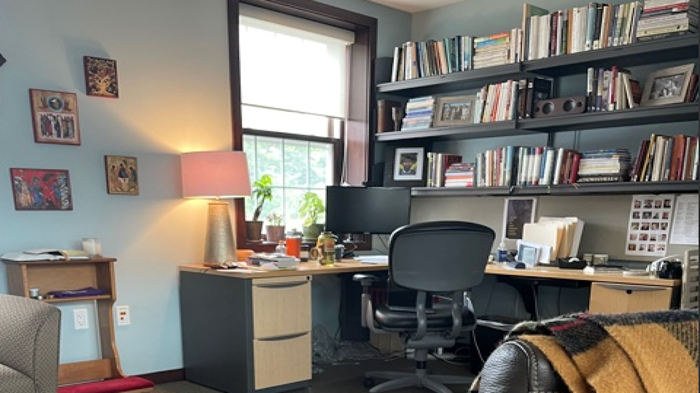How and Where I Write: Winn Collier

David George Moore
It’s been my privilege to be in the personal spaces of several writers. Among others, Pulitzer winner Tony Horwitz warmly welcomed me at his home on Martha’s Vineyard as did William F. Buckley at his place on Long Island Sound.
I have interviewed over 200 authors. Everyone has their own style with reading, capturing what they have read, research, and then writing. In my own writing I have settled on an approach that certainly has its idiosyncrasies.
Along with other works, Winn Collier is the biographer of A Burning in My Bones: The Authorized Biography of Eugene Peterson.
Collier serves as director of the Eugene Peterson Center and is an associate professor of pastoral theology and Christian imagination at Western Theological Seminary.
Moore: Do you still acquire books as you get older, or have you slowed down a bit?
Collier: I think I have become slightly more sane, but that really only means that I have gone from obsessively gathering books to almost-obsessively gathering books.
Moore: What are the best time(s) and place(s) for you to write?
Collier: For maybe 16 years, Monday has been my dedicated writing day (with other times squeezed in). That’s been disrupted the past 8 months or so, with a move to Michigan and catching my wind after spending 3.5 years writing the biography. But I’m eager to return to this rhythm. I agree with Anne Lamott than you can’t start a book or a diet on a Friday. On Mondays, I can give sentences fresh energy before the week overwhelms me.
Moore: How do you capture your research? Old school with note cards etc., or new school with computer programs?
Collier: I squirrel away ideas anywhere and everywhere. I’m a little mad hatter. I have scraps of paper with scribbled lines, books with loads of underlining, notes on my phone with random characters and lines and dialogue and broad book ideas. I have a program on my laptop where I file quotations, bits of poetry and stories and prayers, and I snap pictures of sentences I want to remember. I also have notebooks with thoughts in my illegible chicken scratch. I need help organizing all the things I’ve organized.
Moore: Do you immediately start writing on the computer (perhaps typewriter) or by longhand?
Collier: Computer
Moore: Do you put marginalia in your physical books?
Collier: Mostly just underlining in pencil. However, sometimes I’ll scribble small sentences or questions—or little symbols that represent disagreement, the need to ponder further, or a place of deep inspiration or resonance.
Moore: Do you read digital books?
Collier: As little as possible. My wife, who’s a more voracious reader than I, disagrees with me here. I like Kindle for reference books and research purposes, but not for those hours of pleasure and joy. Reading is a sensual act, and unfortunately plastic and pixels are no substitute for the rough edge of the page, coffee stains on a cover, or the smell of ink.
Moore: What is some good advice you received on writing?
Collier: Cut and cut and cut. Then cut more.
Moore: What do you think is your best book?
Collier: I probably need a little more time and distance to decide if it’s A Burning in My Bones or my epistolary novel Love Big, Be Well. I love them both, and they’re so different from each other and anything else I’ve written.
Moore: Please name a few of your favorite authors from your own field of study
Collier: Fleming Rutledge, Robert Jenson, Rowan Williams, Martin Luther King, Jr., and Frederick Bauerschmidt in theology. Mary Karr, Wendell Berry, Marilynne Robinson, and Kent Haruff in fiction/creative writing.
Moore: What is a book you should have read by now, but haven't? This will make all of us sleep better!
Collier: Crime and Punishment, Dostoevsky
David George Moore is the author of the just released Stuck in the Present: How History Frees and Forms Christians (Leafwood/Abilene Christian University Press). Stuck in the Present: David George Moore: 9781684264605: Amazon.com: Books
Jesus Creed is a part of CT's
Blog Forum. Support the work of CT.
Subscribe and get one year free.
The views of the blogger do not necessarily reflect those of Christianity Today.


















